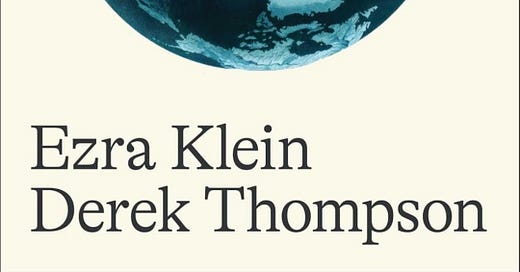Ezra Klein and Derek Thompson begin Abundance with a depiction of what a clean, green future might look like in 2050. Power from solar, wind, geothermal, and nuclear sources, ocean water purified at desalination plants, vegetables grown at a nearby vertical farming operation, and cellular meat production are all part of this image.
Starting with a vision of the future before plunging into an examination of what’s wrong in the present is deliberate. If you don’t have a clear vision of where you want to go, then it’s hard to create a road map to get there. Just carrying on with past practices, the authors argue, aren’t going to get us anywhere good.
While they are critical of both the political right and left, the authors ultimately believe in the value of the latter, particularly with respect to acknowledging the reality of climate change.
Klein and Thompson state that “to have the future we want, we need to build and invent more of what we need.” They provide examples of liberals’ tendency to get so entangled in regulations that they’ve forgotten how to build. The authors offer examples like the failure to complete infrastructure like rapid transit in certain cities, and the lack of affordable housing in many jurisdictions.
Abundance spends a fair bit of time discussing affordable housing—how zoning regulations have become a form of anti-growth, and how lack of affordable places to live has driven people to relocate to less expensive areas.
There is also extensive discussion of the importance of fueling innovation in science and medical fields, and the ways that excessive amounts of paperwork and restrictions make it difficult to get things done. Furthermore, the authors advocate for the importance of not only inventing, but also leveraging those inventions by manufacturing or producing what is invented. The authors give examples of U.S. inventions whose value wasn’t recognized, leaving other countries to benefit and profit from them instead.
Klein and Thompson, while reinforcing some of the values of the political left, argue that change is necessary. It’s not enough to do what has been done in the past and think that will be enough.
Furthermore, they argue that while many of the causes cherished by the political left are worthy aspirations, there has not been enough recognition that trade-offs are sometimes necessary. Trying to be everything to everybody can lead to paralysis, and the slow pace of development, often hampered by red tape, is offered as a case in point.
In the book’s conclusion, the authors suggest that the United States is in a watershed moment. They argue that the philosophies and strategies developed in the past—often with good reason, responding to the situations that existed—may not be as relevant now. They trace the rise and fall of the “New Deal” order from 1930 to 1970, and argue that the neoliberal order, which rose in the 1970s, started to decline in the 2010s. “We are in a rare period of American history, when the decline of one political order makes space for another,” they state.
The future, Klein and Thompson say, will be a choice between a philosophy of scarcity and one of abundance. They note that “The politics of scarcity can be seductive. When there is not enough to go around, we look with suspicion on anyone who might take what we have.” In order to argue successfully for a vision of abundance, the political left will need to demonstrate the ability to take meaningful action on issues like affordable housing.
“As a Canadian writing for a Canadian book review site, I was conscious while reading the book (which was U.S.-centric) of asking myself about the relevance to a Canadian audience. I couldn’t help feeling that there’s plenty of value of Canadians here.”
As a Canadian writing for a Canadian book review site, I was conscious while reading the book (which was U.S.-centric) of asking myself about the relevance to a Canadian audience. I couldn’t help feeling that there’s plenty of value of Canadians here. For one thing, world events have made it clear that what happens south of the border can influence Canadians. For another, though laws and circumstances aren’t identical, there are likely some lessons to be learned from the American experience. The authors’ comments about the rise of populist movements globally and the politics of scarcity versus abundance also hold relevance in Canada.
Recently, I attended a webinar that discussed environmental issues related to the political election that was then in full swing in Ontario. It was during the same time frame that I read Abundance. Some of the comments made at the webinar about affordable housing solutions and the importance of taking concrete action to improve the situation had parallels to the arguments in Abundance.
Readers who are seeking a perspective on some of the factors leading to our current political climate, and wondering where our best hope lies in making things better, may find some helpful insights in Abundance.
About the Authors
Ezra Klein is an opinion columnist and host of the award-winning Ezra Klein Show podcast at The New York Times. He is the author of Why We’re Polarized, an instant New York Times bestseller, named one of Barack Obama’s top books of 2022. He lives in Brooklyn, New York.
Derek Thompson is a staff writer at The Atlantic and the host of the podcast Plain English. He is the author of the national bestseller Hit Makers and On Work, an anthology of his writing on labor and technology. He lives in Chapel Hill, North Carolina.
Book Details
Publisher : Avid Reader Press / Simon & Schuster (March 18 2025)
Language : English
Hardcover : 304 pages
ISBN-10 : 1668023482
ISBN-13 : 978-1668023488





